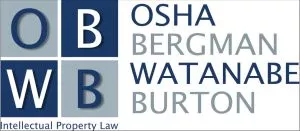- within Technology topic(s)
- with readers working within the Advertising & Public Relations and Property industries
How Osha, Bergman, Watanabe, and Burton are developing the next generation of patent practitioners
(Reprint courtesy of "The Agent" - an AIPLA Patent Agents Committee Publication)
A physicist turned Patent Engineer. A seismic chief R&D advisor turned Patent Agent. An R&D engineer turned Patent Attorney and Partner. These are just a few examples of the career transitions made possible by the Osha Bergman Watanabe & Burton (OBWB) Intellectual Property Training Program (IPTP).
Since its inception in 1998, OBWB has developed and continues to develop a technically and legally savvy team of patent professionals through its IPTP. The Firm actively seeks out science and engineering graduates, often from academia or industry, recruiting them to join OBWB as Patent Engineers. As their expertise grows, Patent Engineers are encouraged to sit for the USPTO registration exam and become Patent Agents. Many graduates of the IPTP continue their professional journey, if desired, by enrolling in law school with tuition support from the Firm. In fact, the majority of OBWB Partners are graduates of the IPTP.
For professionals looking to shift gears into patent law without leaving their technical roots behind, the IPTP offers a clear and structured path. The IPTP is divided into three progressive phases. The first, 12-lecture phase offers a highlevel overview of IP concepts. This phase is particularly useful for those who may not require in-depth legal training and for anyone assessing whether a career in IP is something they would want to pursue. The second, 24-lecture phase dives deeper into the practical aspects of patent law, covering topics such as claim drafting, prosecution strategies, and post-grant procedures.
The third and final, 21-lecture phase provides advanced training, focusing on specialized legal topics, such as 35 U.S.C. § 101 rejections, patentability of AI related inventions, and foreign jurisdictions, including Europe, Japan, China, and the Middle East. The IPTP undergoes continuous improvement, with major revisions every few years. In particular, the new 2025 curriculum includes a broader focus on IP beyond patents, incorporating training on topics such as trademarks, attorney/client relations, and harmonization. In addition, to reinforce learning, the new IPTP includes short exams at the end of each phase, and participants who successfully complete and pass these exams receive certificates. This is particularly valuable for foreign associates and client trainees who can use these certifications as professional recognition credentials in their respective fields.
"The IPTP has introduced me to the world of IP and shown me that OBWB lives out its core values. The new program strikes an effective balance between high-level IP concepts and useful tips for everyday practice, particularly thanks to the threephase structure. I have been impressed by the time and care that has been put into each lecture, with Partners and colleagues demonstrating their commitment to training and dedication to high-quality work. Importantly, the program has confirmed my desire to pursue a career in the IP field, and I am grateful to be learning and working within such a supportive community," says Megan Jariwala, a recent graduate from the 2025 IPTP.
At OBWB, the goal is clear: provide high-quality work and cost-effective IP representation for clients, while fostering an environment that values learning, growth, and community. By developing a team of professionals who are experts in both the technical and legal aspects of patent law, OBWB continues to set the standard for IP excellence since 1998.
The content of this article is intended to provide a general guide to the subject matter. Specialist advice should be sought about your specific circumstances.


